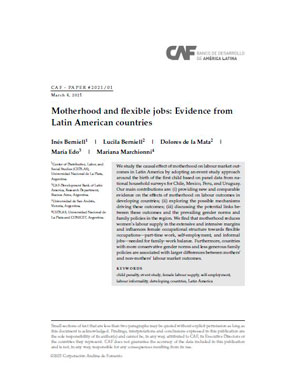| dc.contributor.author | Berniell, Inés | |
| dc.contributor.author | Berniell, Lucila | |
| dc.contributor.author | de la Mata, Dolores | |
| dc.contributor.author | Edo, María | |
| dc.contributor.author | Fawaz, Yarine | |
| dc.contributor.author | Machado, Matilde P. | |
| dc.coverage.spatial | América Latina y el Caribe | es_ES |
| dc.date.accessioned | 2021-12-28T20:19:43Z | |
| dc.date.available | 2021-12-28T20:19:43Z | |
| dc.date.issued | 2021-12-28 | |
| dc.identifier.citation | Berniell, I., Berniell, L., de la Mata, D., Edo, M., Fawaz, Y., & Machado, M. P. (2021, December 28). Motherhood, Pregnancy or Marriage Effects. Caracas: CAF. Retrieved from https://scioteca.caf.com/handle/123456789/1860 | en_GB |
| dc.identifier.uri | https://scioteca.caf.com/handle/123456789/1860 | |
| dc.description.tableofcontents | The existence of large child penalties on women’s labor market outcomes has been documented for multiple countries and time periods. In this paper, we assess to what extent marriage decisions and pregnancies (including those ending in non-live births), may explain partly these child penalties. Using data for 29 countries drawn from SHARE, we show that although marriage has a negative effect on women’s employment (3.3%), its magnitude is much smaller compared with the negative effect of a first child (23%). Moreover, we find that pregnancies that end in non-live births have non-statistically significant effects on employment in the following years, supporting the exogeneity
assumption underlying the identification in child penalty studies. These new results lend support to the hypothesis that child-rearing, rather than marriage or pregnancy, is responsible for women exiting the labor force upon motherhood. | es_ES |
| dc.language.iso | en | es_ES |
| dc.publisher | CAF | es_ES |
| dc.subject | Economía | es_ES |
| dc.subject | Familia | es_ES |
| dc.subject | Investigación socioeconómica | es_ES |
| dc.subject | Mujer | es_ES |
| dc.subject | Niñez | es_ES |
| dc.title | Motherhood, Pregnancy or Marriage Effects | es_ES |
| dc.type | workingPaper | es_ES |
| dc.publisher.city | Caracas | es_ES |




